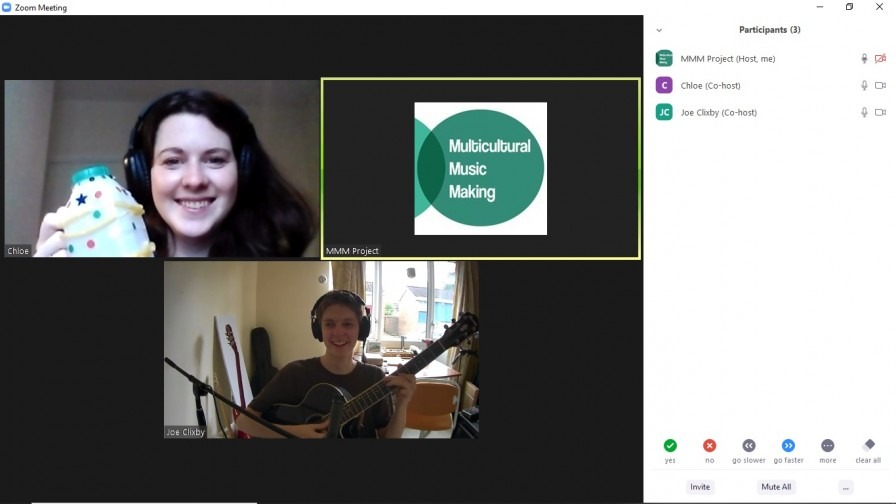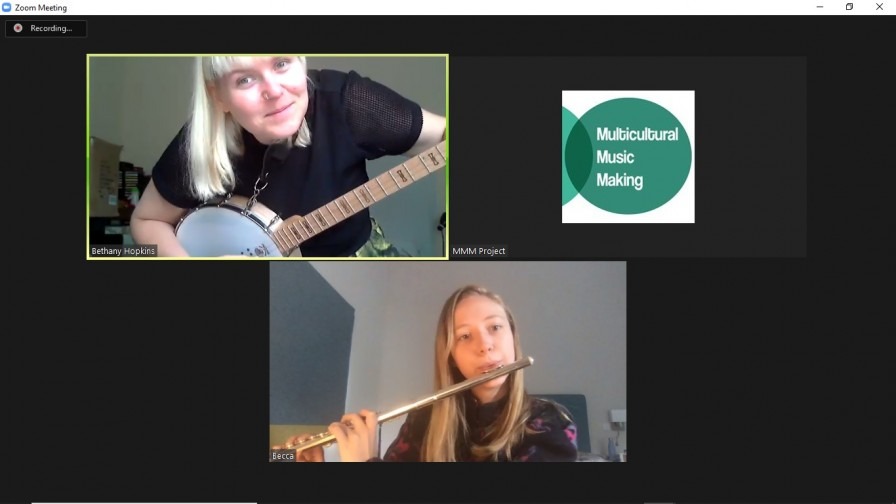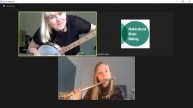MMM Thoughts From Lockdown - 02

Having delivered our programme unexpectedly online after lockdown occurred, I’ve invited our two lead musicians – Beth Hopkins and Chloe Knibbs – to share their thoughts on the experience, and what it’s been like for them.
Chloe says:
As one of the lead facilitators on MMM, lockdown has certainly given me a different perspective on what can be achieved within a digital context, and how vital it is right now to maintain a space for children that values their creativity, curiosity and playfulness. I think it has been particularly valuable to allow for space to experiment with different activities as a team, discuss ways of overcoming obstacles and test out the sessions prior to meeting with the children so we had a sense of what their experience would be.
The school I have been connected with has focused primarily on children who are from keyworkers’ families so are currently attending school, which has meant getting to know lots of new children. At first, I had concerns about building a rapport with a new group of children in this way, but as the sessions continued I do feel that we have been able to make meaningful connections, have fun and make music together.
We have found call and response songs such as “Fanga Alafia” (a song a connection to Nigeria and the US) particularly effective in overcoming any delay issues, as well as songs that can be sung over one chord. In addition, the power of movement to energise young people and embrace a suitable level of silliness has been fantastic and so we began to include more dance-based activities within our sessions, and these moments are doubly great as they allow children to have an opportunity to lead some of the movement.
Inspired by various instruments from across the world, from shekeres to adungus (a type of Ugandan harp) the children have also created their own instruments from recycled materials and it has been wonderful to see their resourcefulness and creativity come to life (the plastic drum kit was particularly impressive!), and the sense of pride these activities have given them. I am definitely still learning and adapting week by week, but I’m very happy that we have been able to explore the best way of re-creating the project in this digital realm and allow children to continue to access music-making and creativity in this way.
Beth says:
Adapting our responsive music making sessions to an online format during a time of collective trauma has been a necessary, rewarding and thought-provoking process.
From initial discussions to delivering we've encountered and solved some challenges and questions along the way. Our biggest challenge - and one that we are least in control of - is around the practicalities of families accessing devices, technology – and, ultimately, our sessions. MMM strives to form meaningful relationships with children and their families, so we were familiar with discussing directly with families, all based in under-funded and economically deprived Ladywood in Birmingham. Fortunately, many of them were able to provide a device for their child to access the internet but for those that weren't able to, with restrictions including our budget, safety concerns regarding Covid-19 and lack of clarity from schools around what was available to loan families, they have sadly missed out on a rare opportunity for live 'face-to-face' musical fun.
It's a shame the government wasn’t ensuring every child had access to much needed technology in order to access online resources.
For those children who have participated, my perception is that our sessions have been a welcome distraction from 'boring maths and english homework' and they have relished being heard… an opportunity to sing and move together and rekindle their friendships. Children have time to offer suggestions, improvise, make instruments, chat to each other, share music they've listened to and most importantly do that as a group, reacting in real time and not just watching static content in a passive role.
Zoom is not a musical platform and we have had to adapt our methods a lot in order to retain our core values. All the work experimenting, learning new songs together, and testing out new ways of facilitating composing have meant we are delivering worthwhile, responsive sessions using international repertoire to stimulate music creation at a time when the scant arts provision that was available has fallen away. Our endeavour to engage as many children as possible has taken many hours of meetings, phone calls, sending text reminders, filming and editing a trailer and generally being proactive and positive in order to make it all happen.
It's been worth every minute.



